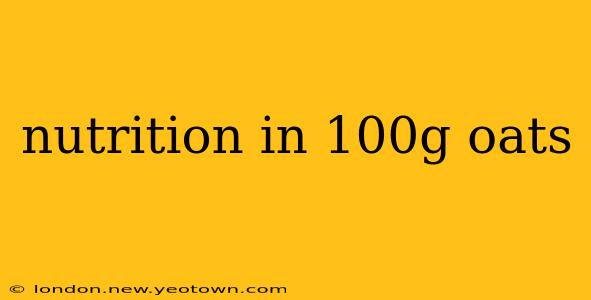Oats. The humble grain that fuels athletes, provides heart-healthy benefits, and offers a delicious start to the day. But how much nutrition are we really getting from that bowl of oatmeal? Let's explore the nutritional powerhouse that is 100g of oats, uncovering the secrets behind this breakfast staple's enduring popularity.
Imagine this: you're standing in the grocery aisle, staring at a mountain of oat containers. Each one promises wholesome goodness, but how do you truly understand what you're getting? This journey delves into the specific nutritional profile of 100 grams of dry oats, providing a detailed breakdown to empower your food choices.
What are the main nutrients in 100g of oats?
A 100g serving of dry rolled oats typically provides a significant punch of nutrients. We're talking substantial amounts of carbohydrates, fiber, and protein, alongside a healthy dose of essential vitamins and minerals. This makes oats a remarkably versatile and nutritious food source, capable of satisfying hunger and supporting overall well-being. Specific quantities will vary slightly depending on the type of oat (rolled, steel-cut, quick-cooking) and processing methods, but the overall nutritional profile remains impressively consistent. Think of it as a reliable foundation for a healthy diet.
How many calories are in 100g of oats?
The calorie count in 100g of dry oats is generally around 389 calories. It's important to note that this is for dry oats. Once you add liquids, milk, fruit, or sweeteners, the calorie count will increase significantly. Therefore, being mindful of portion sizes and added ingredients is key to managing your daily caloric intake effectively. Understanding this baseline calorie count allows for better control over your overall dietary plan.
What is the fiber content in 100g of oats?
One of the most celebrated aspects of oats is their high fiber content. A 100g serving of dry oats boasts approximately 10 grams of dietary fiber. This fiber is a blend of both soluble and insoluble fiber, working together to support healthy digestion and promote gut health. Soluble fiber, in particular, helps to lower cholesterol levels, contributing to cardiovascular health. Insoluble fiber aids in regularity, preventing constipation. This impressive fiber profile highlights oats' role in maintaining a balanced and functional digestive system.
Is 100g of oats enough for a meal?
Whether 100g of oats is enough for a meal depends entirely on your individual needs and activity levels. For some, it might be a satisfying and filling breakfast, providing sustained energy throughout the morning. For others, it might serve as a smaller component of a larger breakfast or as a healthy snack. Consider factors like your metabolism, physical activity, and overall dietary goals when determining appropriate portion sizes. Listening to your body's hunger cues is crucial in finding the right amount for you.
What are the benefits of eating 100g of oats daily?
The benefits extend beyond simple satiety. Regular consumption of oats, even in a 100g serving, can contribute to improved heart health due to its soluble fiber content, which helps lower LDL ("bad") cholesterol. The fiber also promotes healthy digestion and helps regulate blood sugar levels, making oats a beneficial addition for individuals managing diabetes or aiming for stable energy levels. Furthermore, the vitamins and minerals present contribute to overall well-being. It's not a magic bullet, but a consistent element of a healthy lifestyle.
Are there any downsides to eating 100g of oats daily?
While generally safe and beneficial, excessive oat consumption might lead to digestive discomfort for some due to its high fiber content. Individuals sensitive to gluten should opt for certified gluten-free oats, as cross-contamination can occur during processing. Moderation, as with any food, is key. While the benefits are numerous, listening to your body's signals is always the best approach. Pay attention to how your body responds to your oats intake, adjusting portion sizes accordingly.
This detailed exploration of the nutritional powerhouse within 100g of oats illuminates the considerable benefits of this humble grain. From its impressive fiber content to its contribution to heart health and sustained energy, oats deserve their place as a dietary staple. Remember, however, that individual needs vary, and consulting a healthcare professional or registered dietitian can provide personalized guidance for incorporating oats effectively into your diet.

